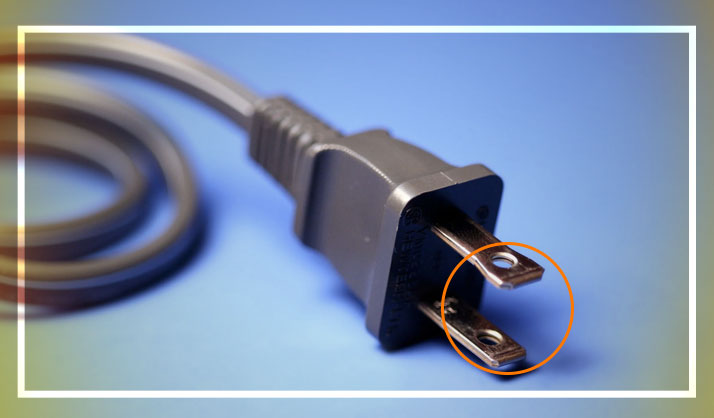We often ignore some little things that have their own purpose of existence that play a vital role in our daily life. Such a little thing is the holes in an electrical outlet’s plug.
An electrical appliance has a plug that is used to get electrical power from an outlet, and often the prongs of the plug have holes in them.
But, have you noticed the holes before and wondered why are there holes in outlet plugs?
If you are curious enough to know the secret behind the holes in an outlet’s plug, here we will reveal the truth to you so that you know the actual purpose of those holes.

Purposes of the Holes in Electrical Plugs Prongs
Actually, there are 4 possible purposes for those holes in electric plug prongs. These are-
1. The Holes Allow to Supply Electricity without Using an Outlet
The second and most important reason for those holes is they allow you to supply current directly to a device, especially if there is no outlet available.
The holes of the prongs allow you to wire cables through them and supply power to through the plug without using an outlet.
In such a situation, these holes will allow you to attach the bear cables to the prongs directly.
2. It Helps to Lock the Prong and Prevent the Device from Using
Another reason for those holes is they allow you to apply a lock to one of the prongs so that no one can plug that gadget into any outlet.
You can apply this prong lock, as a safety purpose. Such as, to prevent the kids from using something like the TV or video games or if the gadget is faulty, and it’s not safe to have it plugged in.
Along with this, the manufacturer can use a little padlock or a plastic tie that goes into those prong holes to “factory-lock” an electrical device. This kind of sealing might be necessary for safety regulations.
This kind of locking might be necessary to ensure industrial safety regulations. A provider may, for instance, put a plastic lock into the prong hole and fasten to a label that tells, “You should read these instructions before plugging it into an outlet.”
For that, the user is guaranteed to see the guidelines since they cannot plug in the gadget without removing the lock.
3. Keeping Holes into the Prongs Saves Some Raw Material
The accrual manufacture of the plug prong may also create such holes into the prongs to save a little amount of raw metal since every little amount of metal counts!
As an example, when the manufacturer produces prongs in bulk and creates holes in them, they melt the metal that is cut because of the holes and make some extra prongs out of it.
4. Maintaining a Firm Grip with the Outlet
According to howstuffworks.com, the important purpose of those holes is they help the outlet to maintain a firm grip with the plug so that it does not come loose and fall down from the outlet.
How? If you disassemble an outlet and examine the contact wipers into which the prongs go, you will notice that they have a little bump on them.
And when you put the plug into an outlet, the prongs go inside and the holes fit with those bumps in a way so that it does not come out from the outlet due to the plug and the cable’s weight.
Hence, a well-made plug won’t just pop out of an outlet and will stay firmly attached to the appliance or item it is plugged into.
In order to keep things operating smoothly, this helps to guarantee that there is no interruption of the electrical supply.
So, these are the reasons for those holes in electric plugs.
But, What Are The Holes In a Plug Called?
Actually, there is no such name for those holes in a plug, so you can call them just “Holes” or “Prong Holes” or “Plug Holes”.
Similarly, you call those holes the way you like, since there is no name restriction on it.
Well, Can I Use a Plug without Holes?
Yes. Of course, you can use plug prongs without holes. According to an official regulation of ANSI (American National Standards Institute), it’s completely optional for manufacturers to keep holes in the prong.
Actually, plugs that come without holes in their prongs can also maintain a firm grip with the outlet for using modern technologies.
But if you want to lock your plug or want to supply power without using an outlet, getting a plug that has holes will be highly beneficial.
Conclusion
Yes, you may wonder after seeing why there are holes in outlet plugs, which is natural. In this discussion, I tried to tell you all the 4 purposes that influence manufacturers to create these holes in the plug’s prong.
Still, you can use a plug that does not have holes in its prongs if you don’t need the benefits of the holes we discussed above.
I’m James. The author of Electricalaffairs.com. It’s been my passion to deal with power tools and gears. This website is mainly to talk about electrical wirings, lighting, various power source tools and accessories. I want to explore tackles and help people to grow their basic knowledge about electrical things. I would also like to help people to pick the right power tool for their daily needs.

All this B.S. and nobody still knows why they are there